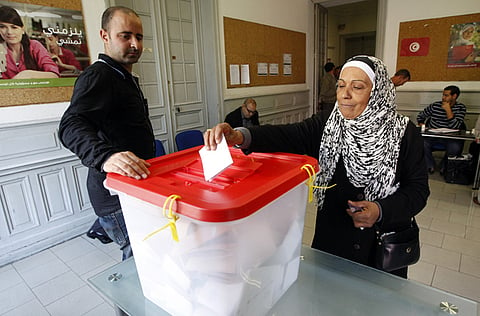Next step for Tunisia and Egypt
Post-revolution progress has not been spectacular, but the youth will force politicians to act

Spend a couple of days in the Tunisian capital Tunis and you feel as if you are in the Egyptian capital Cairo. Enthusiastic youth tell you they are frustrated and feel that the revolution has been hijacked by politicians, elders debate the need for stability and "a push to get the economy moving", leftists denounce the Islamists' election success, and Islamists spare no effort to tell people that they are not what they fear.
The seminar on life after revolution that I participated in was held in a hotel on Habib Bourguiba Avenue in front of the interior ministry. That is where the revolution against the president Zine Al Abidine Bin Ali culminated on January 14. Surrounded by barbed wire, the security headquarters is still protected by tanks and armoured vehicles — exactly like its Egyptian counterpart in Bab Al Louk in Cairo. Yet, the army in Tunisian politics is different from its Egyptian counterpart — it's not much into politics or business.
In a recent article titled ‘Khaki Capitalism', the Economist said the army in Egypt controls 10 per cent of the economy. The Supreme Council of Armed forces (SCAF) is ruling Egypt since February. In Tunisia, the army might have helped oust Bin Ali but it stayed away from politics — at least openly.
The military's role in change is not the only difference between the revolutions in Egypt and Tunisia, but it is of greater significance. Though some people in Tunisia tell you about the role of army chief General Rashid Bin Al Ammar in ousting Bin Ali, he is not manipulating the political process after the revolution — let alone controlling it like the SCAF in Egypt.
As leader of Al Nahda, Shaikh Rashid Gannouchi, told me they thank God that the Egyptians revolted right after Tunisia. "That spared us the attention and meddling of many vile forces", he said, implying that those regional and international forces are focusing on Egypt. Yet, the Egyptian youth in Tahrir Square hope Tunisia takes the lead from this point.
Scepticism
So I took part in the one-day seminar attended by politicians, academics and media people from different aspects of the Tunisian political spectrum. I heard more about the socio-economic challenges and the risks ahead.
Representatives of Al Nahda, that won a majority in elections, wanted to present an action plan that would create jobs and improve the political process. The rest were sceptical, and one came to the conclusion that many see the Bin Ali regime being replaced by an authoritarian, oppressive and corrupt regime with "totalitarian" Islamists.
At some point I thought that Tunisia may see a repeat of the Algerian crisis of 1992 when the army annulled the election won by Islamic Salvation Front (FIS) and the country descended into chaos and civil strife. But when I talked to Tunisian youth and elderly activists I refuted that thought.
Conspiracy theories are rife in Tunisia that everything is planned and "meant to create chaos and weaken the nation". They talk to you about Libya and Nato and how weapons are being smuggled across the border thereby jeopardising the security of Tunisians.
The mood against Qatar is getting stronger, and the love for Al Jazeera hailed during the revolution is turning into suspicion and criticism. You even hear some sympathising with Syria against "Qatari and western intervention". Actually, Tunisians seem to be more politicised and ‘ideologised' than I previously thought.
Despite all this debate and fierce media battles, Tunisia seems to be on the right track to set an example of post-dictatorial change. As a small country geographically distant from Israel and with no oil or gas that Europe relies on, it won't take long to establish a sound democracy and set off on the road to economic development.
Bumpy road
That process, however, will be more complicated and prolonged in Egypt. It will be a hard bumpy ride characterised by more downs than ups until stability is eventually created. But in both countries, growing awareness among the youth holds promise — they evaluate the risks, appreciate the fact that they have little experience compared to the older generation of ‘strugglers', and will not let go of their right to shape a better future.
The situation is akin to a long neglected ailing body that has been presented with a new cure. Pain and suffering is inevitable and a lot of ‘pus' has to be cleaned from the wounds for any healing to commence.
All this wrangling in politics between Islamists and liberalists will eventually settle down as pressing socio-economic challenges force these political factions to prove their reliability by providing solutions rather than mere criticism of each other.
If not, they seriously risk losing the public's trust as people want to see improvement in their living conditions. Tunisians are talking now about "judgement day" for all these politicians will come in a year's time when the elected Establishing Assembly dissolves after writing the constitution and general elections are held.
That's the main advantage Tunisia has in setting an example for the region. Egypt is struggling with an election that might not be the right way to establish a new path, and might end up reproducing the old regime. But the youth, and activists in Egypt are also aware of this and will face that prospect in due time — even though it might take longer and be more painful.
Dr Ayman Mustafa is a London-based Arab writer.


